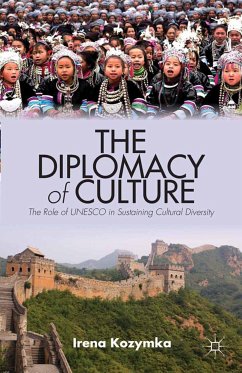Dieser Download kann aus rechtlichen Gründen nur mit Rechnungsadresse in A, B, BG, CY, CZ, D, DK, EW, E, FIN, F, GR, HR, H, IRL, I, LT, L, LR, M, NL, PL, P, R, S, SLO, SK ausgeliefert werden.
"Irena Kozymka has written an insightful analysis of a subject too neglected by academic International Relations how diplomacy deals with culture and cultural diversity, a rather different matter from 'cultural diplomacy.' Her comparative treatment of different national traditions, combined with an expert study of UNESCO, makes this indispensable for those concerned with both the international politics of culture and with international organizations." - Christopher Hill, Sir Patrick Sheehy Professor of International Relations, and Head of Politics and International Studies Department, University of Cambridge









